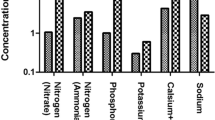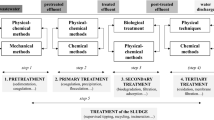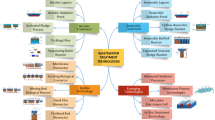Abstract
The global use of wastewater for irrigation in agriculture is increasing, as are the requirements for more stringent wastewater treatment standards, to prevent environmental and health risks. The aim of this paper is to display a cost-benefit analysis of introducing more stringent standards for wastewater treatment in Israel, and to examine whether upgrading the wastewater treatment facilities is economically justified. The findings indicate that the introduction of the stringent standards as well as upgrading the treatment facilities are economically justified.
Similar content being viewed by others
References
Adan Technologies Report, 2001: The benefits of using saltwater through dilution with desalinated seawater from the Ashkelon desalination plant, 2001.
Aiello, R., Cirelli, G.L., and Consoli, S., Effects of reclaimed wastewater irrigation on soil and tomato fruits: a case study in sicily (Italy), Agricultural Water Management, 2007, vol. 93, nos. 1–2, pp. 65–72.
Bahri, A., Agricultural reuse of wastewater and global water management, Water Sci. Technol., 1999, vol. 40, nos. 4–5, pp. 339–346.
European Commission, 2008: Guide to cost-benefit analysis of investment projects, http://ec.europa.eu/regional_policy/sources/docgener/guides/cost/guide2008_en.pdf.
Feinerman, E., Crop density and irrigation with saline water, Western Journal of Agricultural Economics, 1983, vol. 8, no. 2, pp. 134–140.
Friedler, E., Water reuse—an integral part of water resources management: Israel as a case study, Water Policy, 2001, vol. 3, pp. 29–39.
Hadas, A., Tarchitzky, J., and Fine, Z., Forecast of Water Use in Agriculture by Water Quality and Region, Israel Ministry of Agriculture, 2001.
Haruvy, N., Agricultural reuse of wastewater: nationwide cost-benefit analysis, Agric., Ecosyst. Environ., 1997, vol. 66, pp. 113–119.
Haruvy, N., Wastewater reuse—regional and economic considerations, Resour., Conserv. Recycl., 1998, vol. 23, pp. 57–66.
Haruvy, N. and Sadan, E., Cost benefit analysis of wastewater treatment in the water scarce economy of Israel: a case study, J. Financial Management and Analysis, 1994, vol. 7, no. 1, pp. 44–51.
Haruvy, N., Shalhevet, S., and Bachmat, Y., A model for integrated water resources management in water-scarce regions: irrigation with wastewater combined with desalination processes, Int. J. Water, 2008, vol. 4, pp. 25–40.
Haruvy, N., Shalhevet, S., and Ravina, I., Irrigation with treated wastewater in Israel—financial and managerial analysis, J. Financial Management and Analysis, 2004, vol. 16, no. 2, pp. 65–73.
Haruvy, N., Shalhevet, S., and Yaron, D., Effect of urban development on water quality—environmental concern, International Water and Irrigation, 2001, vol. 21, no. 2, pp. 24–32.
Inbar, Y., New standards for treated wastewater reuse in Israel, in Wastewater Reuse—Risk Assessment, Decision-Making and Environmental Security, Zaidi, M.K., Ed., Session 8, 2007, pp. 291–296.
Israel Ministry of Environmental Protection, 2005: Disposal of reclaimed water for irrigation, http://www.sviva.gov.il/bin/en.jsp?enPage=BlankPage&enDisplay=view&enDispWhat=Object&enDispWho=Articals l730&enZone=waste_discharge.
Israel Ministry of Environmental Protection, 2008: The path towards sustainable development in Israel, http://www.sviva.gov.il/Enviroment/Static/Binaries/ModulKvatzim/p0463-2.pdf.
Lavee, D., A cost-benefit analysis of alternative waste-water treatment standards: a case study in Israel, Water Environ. J., 2011, vol. 25, no. 4, pp. 504–512.
Leal, R.M.P., Herpin, U., da Fonseca, A.F., Firme, L.P., Montes, C.R., and Melfi, A.J., Sodicity and salinity in a Brazilian oxisol cultivated with sugarcane irrigated with wastewater, Agricultural Water Management, 2009, vol. 96, no. 2, pp. 307–316.
Molinos-Senante, M., Hernández-Sancho, F., and Sala-Garrido, R., Cost-benefit analysis of water-reuse projects for environmental purposes: a case study for Spanish wastewater treatment plants, J. Environ. Manage., 2011, vol. 92, pp. 3091–3097.
Pales, A.M., Pasquale, V., Celano, G., Figliuolo, G., Masi, S., and Xioyannis, C., Irrigation of olive groves in Southern Italy with treated municipal wastewater: effects on microbiological quality of soil and fruits, Agric., Ecosyst. Environ., 2009, vol. 129, nos. 1–3, pp. 43–51.
Pareto-Engineering Report, Final Report of the Committee for Establishing Wastewater Treatment Standards, 2003, http://old.sviva.gov.il/Enviroment/Static/Binaries/index_pirsumim/p0321_1.pdf.
Scheierling, S.M., Bartone, C., Mara, D.D., and Drechsel, P., Improving Wastewater Use in Agriculture: An Emerging Priority, Policy Research Working Paper no. WPS 5412, Washington, DC: World Bank, 2010.
Van der Bruggen, B., Goossens, H., Everard, P.A., Stemgee, K., and Rogge, W., Cost-benefit analysis of central softening for production of drinking water, J. Environ. Manage., 2009, vol. 91, no. 2, pp. 541–549.
Winpenny, J.T., Heinz, I., and Koo-Oshima, S., The Wealth of Waste: The Economics of Wastewater Use in Agriculture, Rome, Italy: Food and Agriculture Organization of the United Nations, 2010.
Author information
Authors and Affiliations
Corresponding author
Additional information
The article is published in the original.
Rights and permissions
About this article
Cite this article
Lavee, D. Is the upgrading of wastewater treatment facilities to meet more stringent standards economically justified: The case of Israel. Water Resour 41, 564–573 (2014). https://doi.org/10.1134/S0097807814050042
Received:
Published:
Issue Date:
DOI: https://doi.org/10.1134/S0097807814050042




